An Argumentative Analysis of Aristotle's Philosophies on Mean
VerifiedAdded on 2022/08/16
|7
|2182
|89
Essay
AI Summary
This essay presents an argumentative analysis of Aristotle's Theory of Mean, focusing on its connection to happiness, ethics, and virtue. The essay begins with an overview of Aristotle's concept of happiness as the ultimate goal, achieved through virtuous actions and the 'mean' between extremes. It then argues against Aristotle's view, suggesting that sustainable happiness isn't solely derived from living in the mean, citing examples like Robin Hood to illustrate that actions outside of ethical boundaries can lead to happiness. The essay explores the role of education and law in cultivating virtuous habits, while also acknowledging that external factors and complex situations can influence actions. The essay concludes by reiterating the argument against the sustainability of the mean theory in today's world, emphasizing that happiness can be achieved through diverse means beyond virtue, and that Aristotle’s philosophical views do not necessarily align with the complexities of human nature and various circumstances.
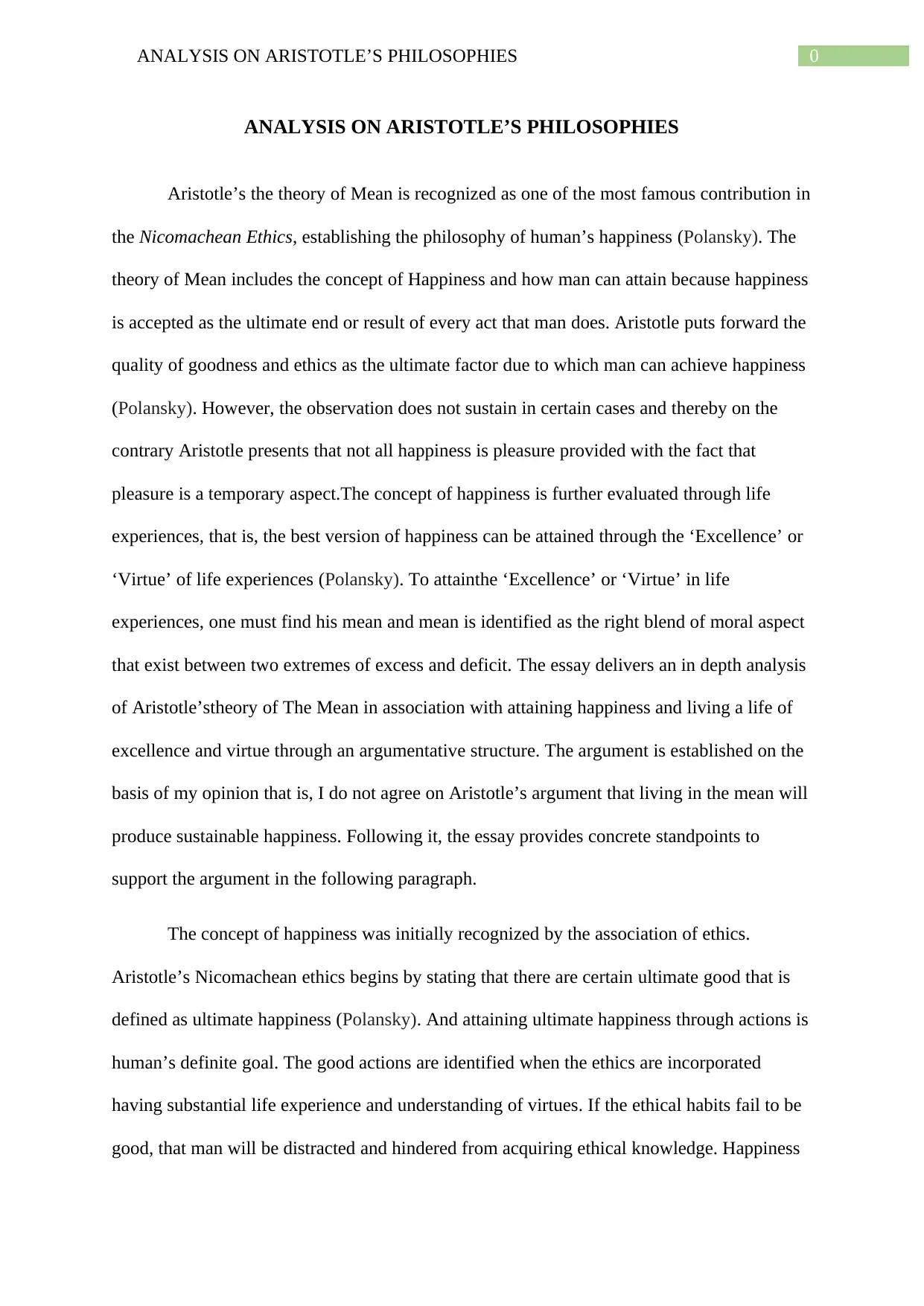
0ANALYSIS ON ARISTOTLE’S PHILOSOPHIES
ANALYSIS ON ARISTOTLE’S PHILOSOPHIES
Aristotle’s the theory of Mean is recognized as one of the most famous contribution in
the Nicomachean Ethics, establishing the philosophy of human’s happiness (Polansky). The
theory of Mean includes the concept of Happiness and how man can attain because happiness
is accepted as the ultimate end or result of every act that man does. Aristotle puts forward the
quality of goodness and ethics as the ultimate factor due to which man can achieve happiness
(Polansky). However, the observation does not sustain in certain cases and thereby on the
contrary Aristotle presents that not all happiness is pleasure provided with the fact that
pleasure is a temporary aspect.The concept of happiness is further evaluated through life
experiences, that is, the best version of happiness can be attained through the ‘Excellence’ or
‘Virtue’ of life experiences (Polansky). To attainthe ‘Excellence’ or ‘Virtue’ in life
experiences, one must find his mean and mean is identified as the right blend of moral aspect
that exist between two extremes of excess and deficit. The essay delivers an in depth analysis
of Aristotle’stheory of The Mean in association with attaining happiness and living a life of
excellence and virtue through an argumentative structure. The argument is established on the
basis of my opinion that is, I do not agree on Aristotle’s argument that living in the mean will
produce sustainable happiness. Following it, the essay provides concrete standpoints to
support the argument in the following paragraph.
The concept of happiness was initially recognized by the association of ethics.
Aristotle’s Nicomachean ethics begins by stating that there are certain ultimate good that is
defined as ultimate happiness (Polansky). And attaining ultimate happiness through actions is
human’s definite goal. The good actions are identified when the ethics are incorporated
having substantial life experience and understanding of virtues. If the ethical habits fail to be
good, that man will be distracted and hindered from acquiring ethical knowledge. Happiness
ANALYSIS ON ARISTOTLE’S PHILOSOPHIES
Aristotle’s the theory of Mean is recognized as one of the most famous contribution in
the Nicomachean Ethics, establishing the philosophy of human’s happiness (Polansky). The
theory of Mean includes the concept of Happiness and how man can attain because happiness
is accepted as the ultimate end or result of every act that man does. Aristotle puts forward the
quality of goodness and ethics as the ultimate factor due to which man can achieve happiness
(Polansky). However, the observation does not sustain in certain cases and thereby on the
contrary Aristotle presents that not all happiness is pleasure provided with the fact that
pleasure is a temporary aspect.The concept of happiness is further evaluated through life
experiences, that is, the best version of happiness can be attained through the ‘Excellence’ or
‘Virtue’ of life experiences (Polansky). To attainthe ‘Excellence’ or ‘Virtue’ in life
experiences, one must find his mean and mean is identified as the right blend of moral aspect
that exist between two extremes of excess and deficit. The essay delivers an in depth analysis
of Aristotle’stheory of The Mean in association with attaining happiness and living a life of
excellence and virtue through an argumentative structure. The argument is established on the
basis of my opinion that is, I do not agree on Aristotle’s argument that living in the mean will
produce sustainable happiness. Following it, the essay provides concrete standpoints to
support the argument in the following paragraph.
The concept of happiness was initially recognized by the association of ethics.
Aristotle’s Nicomachean ethics begins by stating that there are certain ultimate good that is
defined as ultimate happiness (Polansky). And attaining ultimate happiness through actions is
human’s definite goal. The good actions are identified when the ethics are incorporated
having substantial life experience and understanding of virtues. If the ethical habits fail to be
good, that man will be distracted and hindered from acquiring ethical knowledge. Happiness
Paraphrase This Document
Need a fresh take? Get an instant paraphrase of this document with our AI Paraphraser
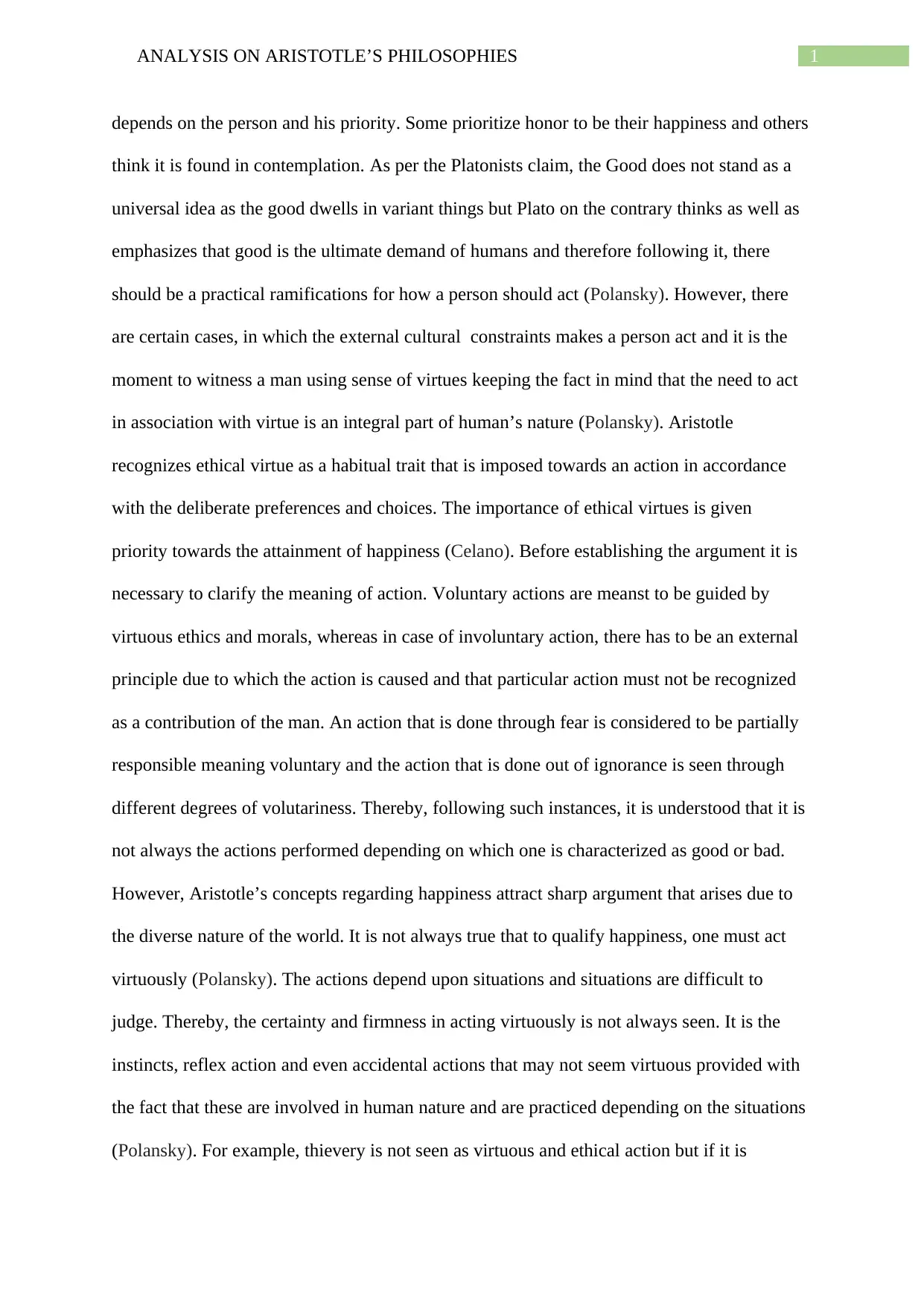
1ANALYSIS ON ARISTOTLE’S PHILOSOPHIES
depends on the person and his priority. Some prioritize honor to be their happiness and others
think it is found in contemplation. As per the Platonists claim, the Good does not stand as a
universal idea as the good dwells in variant things but Plato on the contrary thinks as well as
emphasizes that good is the ultimate demand of humans and therefore following it, there
should be a practical ramifications for how a person should act (Polansky). However, there
are certain cases, in which the external cultural constraints makes a person act and it is the
moment to witness a man using sense of virtues keeping the fact in mind that the need to act
in association with virtue is an integral part of human’s nature (Polansky). Aristotle
recognizes ethical virtue as a habitual trait that is imposed towards an action in accordance
with the deliberate preferences and choices. The importance of ethical virtues is given
priority towards the attainment of happiness (Celano). Before establishing the argument it is
necessary to clarify the meaning of action. Voluntary actions are meanst to be guided by
virtuous ethics and morals, whereas in case of involuntary action, there has to be an external
principle due to which the action is caused and that particular action must not be recognized
as a contribution of the man. An action that is done through fear is considered to be partially
responsible meaning voluntary and the action that is done out of ignorance is seen through
different degrees of volutariness. Thereby, following such instances, it is understood that it is
not always the actions performed depending on which one is characterized as good or bad.
However, Aristotle’s concepts regarding happiness attract sharp argument that arises due to
the diverse nature of the world. It is not always true that to qualify happiness, one must act
virtuously (Polansky). The actions depend upon situations and situations are difficult to
judge. Thereby, the certainty and firmness in acting virtuously is not always seen. It is the
instincts, reflex action and even accidental actions that may not seem virtuous provided with
the fact that these are involved in human nature and are practiced depending on the situations
(Polansky). For example, thievery is not seen as virtuous and ethical action but if it is
depends on the person and his priority. Some prioritize honor to be their happiness and others
think it is found in contemplation. As per the Platonists claim, the Good does not stand as a
universal idea as the good dwells in variant things but Plato on the contrary thinks as well as
emphasizes that good is the ultimate demand of humans and therefore following it, there
should be a practical ramifications for how a person should act (Polansky). However, there
are certain cases, in which the external cultural constraints makes a person act and it is the
moment to witness a man using sense of virtues keeping the fact in mind that the need to act
in association with virtue is an integral part of human’s nature (Polansky). Aristotle
recognizes ethical virtue as a habitual trait that is imposed towards an action in accordance
with the deliberate preferences and choices. The importance of ethical virtues is given
priority towards the attainment of happiness (Celano). Before establishing the argument it is
necessary to clarify the meaning of action. Voluntary actions are meanst to be guided by
virtuous ethics and morals, whereas in case of involuntary action, there has to be an external
principle due to which the action is caused and that particular action must not be recognized
as a contribution of the man. An action that is done through fear is considered to be partially
responsible meaning voluntary and the action that is done out of ignorance is seen through
different degrees of volutariness. Thereby, following such instances, it is understood that it is
not always the actions performed depending on which one is characterized as good or bad.
However, Aristotle’s concepts regarding happiness attract sharp argument that arises due to
the diverse nature of the world. It is not always true that to qualify happiness, one must act
virtuously (Polansky). The actions depend upon situations and situations are difficult to
judge. Thereby, the certainty and firmness in acting virtuously is not always seen. It is the
instincts, reflex action and even accidental actions that may not seem virtuous provided with
the fact that these are involved in human nature and are practiced depending on the situations
(Polansky). For example, thievery is not seen as virtuous and ethical action but if it is
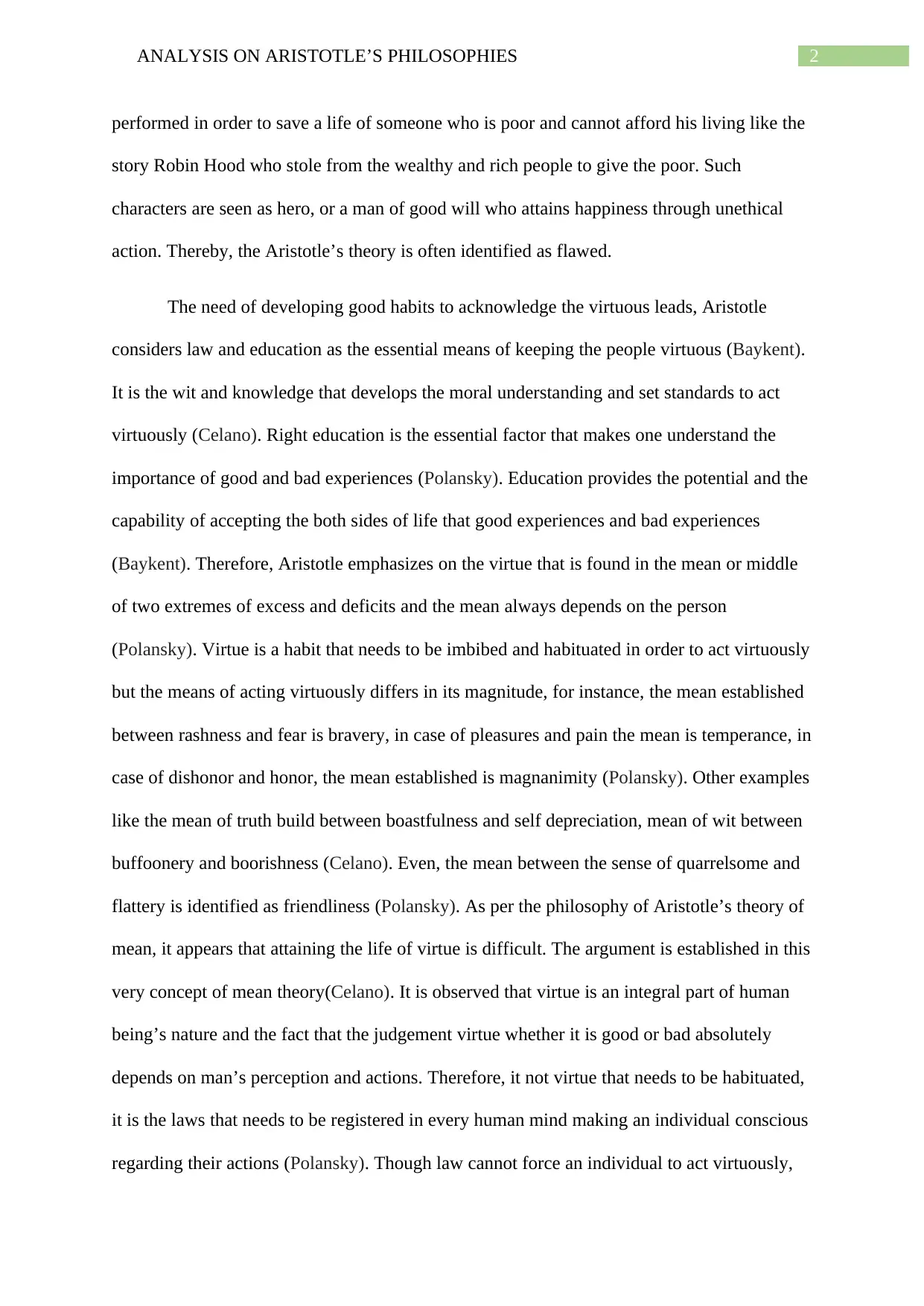
2ANALYSIS ON ARISTOTLE’S PHILOSOPHIES
performed in order to save a life of someone who is poor and cannot afford his living like the
story Robin Hood who stole from the wealthy and rich people to give the poor. Such
characters are seen as hero, or a man of good will who attains happiness through unethical
action. Thereby, the Aristotle’s theory is often identified as flawed.
The need of developing good habits to acknowledge the virtuous leads, Aristotle
considers law and education as the essential means of keeping the people virtuous (Baykent).
It is the wit and knowledge that develops the moral understanding and set standards to act
virtuously (Celano). Right education is the essential factor that makes one understand the
importance of good and bad experiences (Polansky). Education provides the potential and the
capability of accepting the both sides of life that good experiences and bad experiences
(Baykent). Therefore, Aristotle emphasizes on the virtue that is found in the mean or middle
of two extremes of excess and deficits and the mean always depends on the person
(Polansky). Virtue is a habit that needs to be imbibed and habituated in order to act virtuously
but the means of acting virtuously differs in its magnitude, for instance, the mean established
between rashness and fear is bravery, in case of pleasures and pain the mean is temperance, in
case of dishonor and honor, the mean established is magnanimity (Polansky). Other examples
like the mean of truth build between boastfulness and self depreciation, mean of wit between
buffoonery and boorishness (Celano). Even, the mean between the sense of quarrelsome and
flattery is identified as friendliness (Polansky). As per the philosophy of Aristotle’s theory of
mean, it appears that attaining the life of virtue is difficult. The argument is established in this
very concept of mean theory(Celano). It is observed that virtue is an integral part of human
being’s nature and the fact that the judgement virtue whether it is good or bad absolutely
depends on man’s perception and actions. Therefore, it not virtue that needs to be habituated,
it is the laws that needs to be registered in every human mind making an individual conscious
regarding their actions (Polansky). Though law cannot force an individual to act virtuously,
performed in order to save a life of someone who is poor and cannot afford his living like the
story Robin Hood who stole from the wealthy and rich people to give the poor. Such
characters are seen as hero, or a man of good will who attains happiness through unethical
action. Thereby, the Aristotle’s theory is often identified as flawed.
The need of developing good habits to acknowledge the virtuous leads, Aristotle
considers law and education as the essential means of keeping the people virtuous (Baykent).
It is the wit and knowledge that develops the moral understanding and set standards to act
virtuously (Celano). Right education is the essential factor that makes one understand the
importance of good and bad experiences (Polansky). Education provides the potential and the
capability of accepting the both sides of life that good experiences and bad experiences
(Baykent). Therefore, Aristotle emphasizes on the virtue that is found in the mean or middle
of two extremes of excess and deficits and the mean always depends on the person
(Polansky). Virtue is a habit that needs to be imbibed and habituated in order to act virtuously
but the means of acting virtuously differs in its magnitude, for instance, the mean established
between rashness and fear is bravery, in case of pleasures and pain the mean is temperance, in
case of dishonor and honor, the mean established is magnanimity (Polansky). Other examples
like the mean of truth build between boastfulness and self depreciation, mean of wit between
buffoonery and boorishness (Celano). Even, the mean between the sense of quarrelsome and
flattery is identified as friendliness (Polansky). As per the philosophy of Aristotle’s theory of
mean, it appears that attaining the life of virtue is difficult. The argument is established in this
very concept of mean theory(Celano). It is observed that virtue is an integral part of human
being’s nature and the fact that the judgement virtue whether it is good or bad absolutely
depends on man’s perception and actions. Therefore, it not virtue that needs to be habituated,
it is the laws that needs to be registered in every human mind making an individual conscious
regarding their actions (Polansky). Though law cannot force an individual to act virtuously,
⊘ This is a preview!⊘
Do you want full access?
Subscribe today to unlock all pages.

Trusted by 1+ million students worldwide
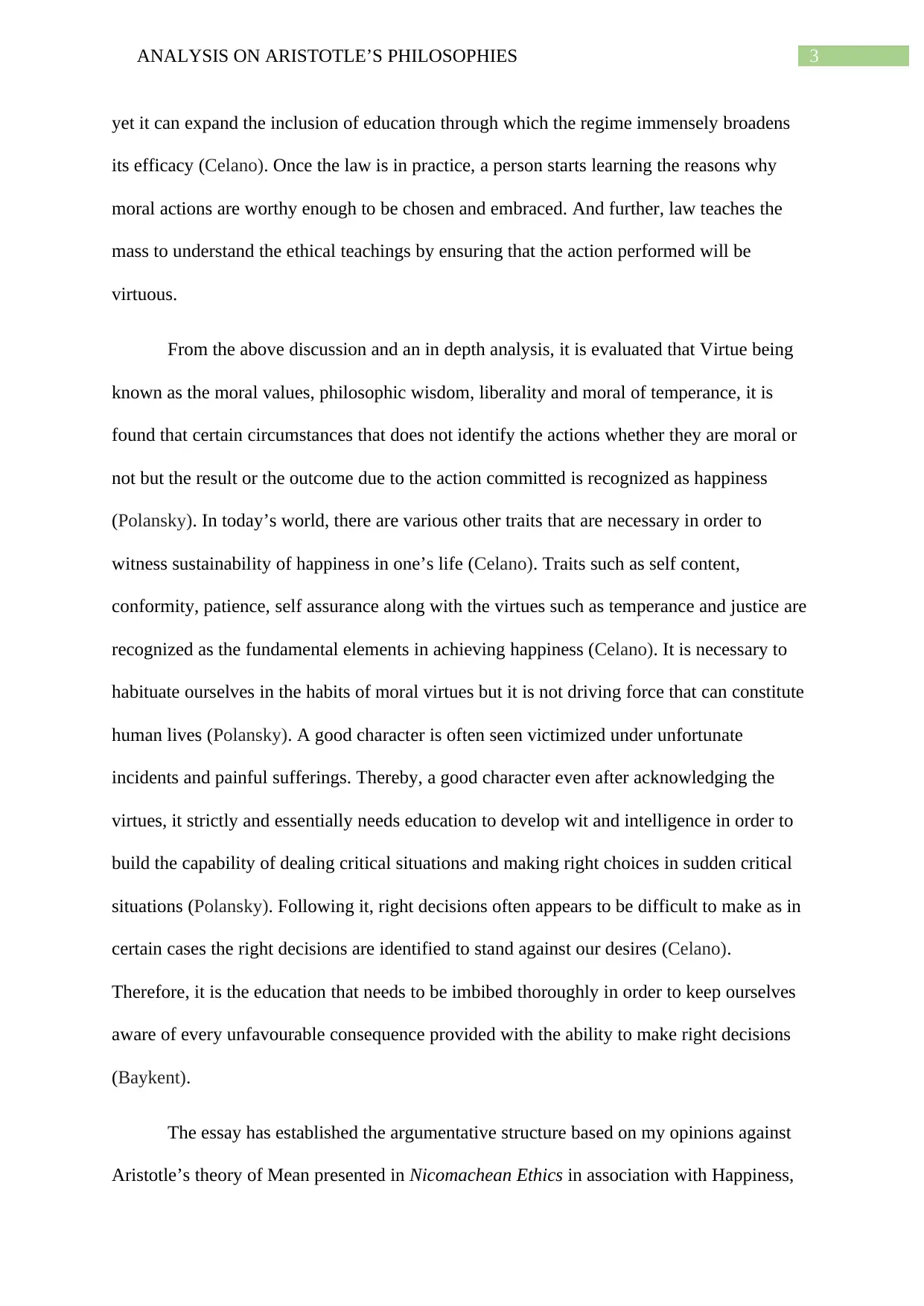
3ANALYSIS ON ARISTOTLE’S PHILOSOPHIES
yet it can expand the inclusion of education through which the regime immensely broadens
its efficacy (Celano). Once the law is in practice, a person starts learning the reasons why
moral actions are worthy enough to be chosen and embraced. And further, law teaches the
mass to understand the ethical teachings by ensuring that the action performed will be
virtuous.
From the above discussion and an in depth analysis, it is evaluated that Virtue being
known as the moral values, philosophic wisdom, liberality and moral of temperance, it is
found that certain circumstances that does not identify the actions whether they are moral or
not but the result or the outcome due to the action committed is recognized as happiness
(Polansky). In today’s world, there are various other traits that are necessary in order to
witness sustainability of happiness in one’s life (Celano). Traits such as self content,
conformity, patience, self assurance along with the virtues such as temperance and justice are
recognized as the fundamental elements in achieving happiness (Celano). It is necessary to
habituate ourselves in the habits of moral virtues but it is not driving force that can constitute
human lives (Polansky). A good character is often seen victimized under unfortunate
incidents and painful sufferings. Thereby, a good character even after acknowledging the
virtues, it strictly and essentially needs education to develop wit and intelligence in order to
build the capability of dealing critical situations and making right choices in sudden critical
situations (Polansky). Following it, right decisions often appears to be difficult to make as in
certain cases the right decisions are identified to stand against our desires (Celano).
Therefore, it is the education that needs to be imbibed thoroughly in order to keep ourselves
aware of every unfavourable consequence provided with the ability to make right decisions
(Baykent).
The essay has established the argumentative structure based on my opinions against
Aristotle’s theory of Mean presented in Nicomachean Ethics in association with Happiness,
yet it can expand the inclusion of education through which the regime immensely broadens
its efficacy (Celano). Once the law is in practice, a person starts learning the reasons why
moral actions are worthy enough to be chosen and embraced. And further, law teaches the
mass to understand the ethical teachings by ensuring that the action performed will be
virtuous.
From the above discussion and an in depth analysis, it is evaluated that Virtue being
known as the moral values, philosophic wisdom, liberality and moral of temperance, it is
found that certain circumstances that does not identify the actions whether they are moral or
not but the result or the outcome due to the action committed is recognized as happiness
(Polansky). In today’s world, there are various other traits that are necessary in order to
witness sustainability of happiness in one’s life (Celano). Traits such as self content,
conformity, patience, self assurance along with the virtues such as temperance and justice are
recognized as the fundamental elements in achieving happiness (Celano). It is necessary to
habituate ourselves in the habits of moral virtues but it is not driving force that can constitute
human lives (Polansky). A good character is often seen victimized under unfortunate
incidents and painful sufferings. Thereby, a good character even after acknowledging the
virtues, it strictly and essentially needs education to develop wit and intelligence in order to
build the capability of dealing critical situations and making right choices in sudden critical
situations (Polansky). Following it, right decisions often appears to be difficult to make as in
certain cases the right decisions are identified to stand against our desires (Celano).
Therefore, it is the education that needs to be imbibed thoroughly in order to keep ourselves
aware of every unfavourable consequence provided with the ability to make right decisions
(Baykent).
The essay has established the argumentative structure based on my opinions against
Aristotle’s theory of Mean presented in Nicomachean Ethics in association with Happiness,
Paraphrase This Document
Need a fresh take? Get an instant paraphrase of this document with our AI Paraphraser
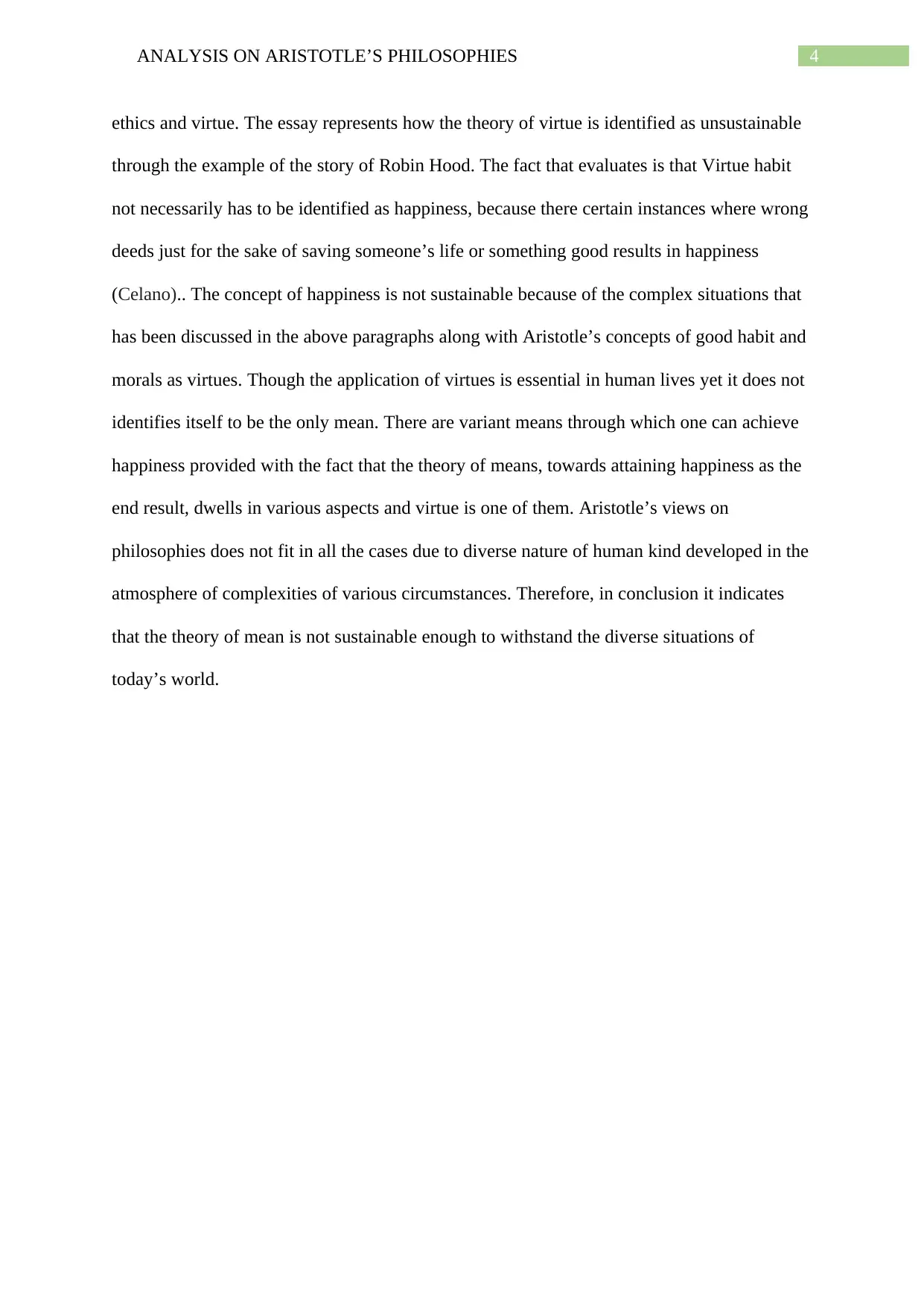
4ANALYSIS ON ARISTOTLE’S PHILOSOPHIES
ethics and virtue. The essay represents how the theory of virtue is identified as unsustainable
through the example of the story of Robin Hood. The fact that evaluates is that Virtue habit
not necessarily has to be identified as happiness, because there certain instances where wrong
deeds just for the sake of saving someone’s life or something good results in happiness
(Celano).. The concept of happiness is not sustainable because of the complex situations that
has been discussed in the above paragraphs along with Aristotle’s concepts of good habit and
morals as virtues. Though the application of virtues is essential in human lives yet it does not
identifies itself to be the only mean. There are variant means through which one can achieve
happiness provided with the fact that the theory of means, towards attaining happiness as the
end result, dwells in various aspects and virtue is one of them. Aristotle’s views on
philosophies does not fit in all the cases due to diverse nature of human kind developed in the
atmosphere of complexities of various circumstances. Therefore, in conclusion it indicates
that the theory of mean is not sustainable enough to withstand the diverse situations of
today’s world.
ethics and virtue. The essay represents how the theory of virtue is identified as unsustainable
through the example of the story of Robin Hood. The fact that evaluates is that Virtue habit
not necessarily has to be identified as happiness, because there certain instances where wrong
deeds just for the sake of saving someone’s life or something good results in happiness
(Celano).. The concept of happiness is not sustainable because of the complex situations that
has been discussed in the above paragraphs along with Aristotle’s concepts of good habit and
morals as virtues. Though the application of virtues is essential in human lives yet it does not
identifies itself to be the only mean. There are variant means through which one can achieve
happiness provided with the fact that the theory of means, towards attaining happiness as the
end result, dwells in various aspects and virtue is one of them. Aristotle’s views on
philosophies does not fit in all the cases due to diverse nature of human kind developed in the
atmosphere of complexities of various circumstances. Therefore, in conclusion it indicates
that the theory of mean is not sustainable enough to withstand the diverse situations of
today’s world.
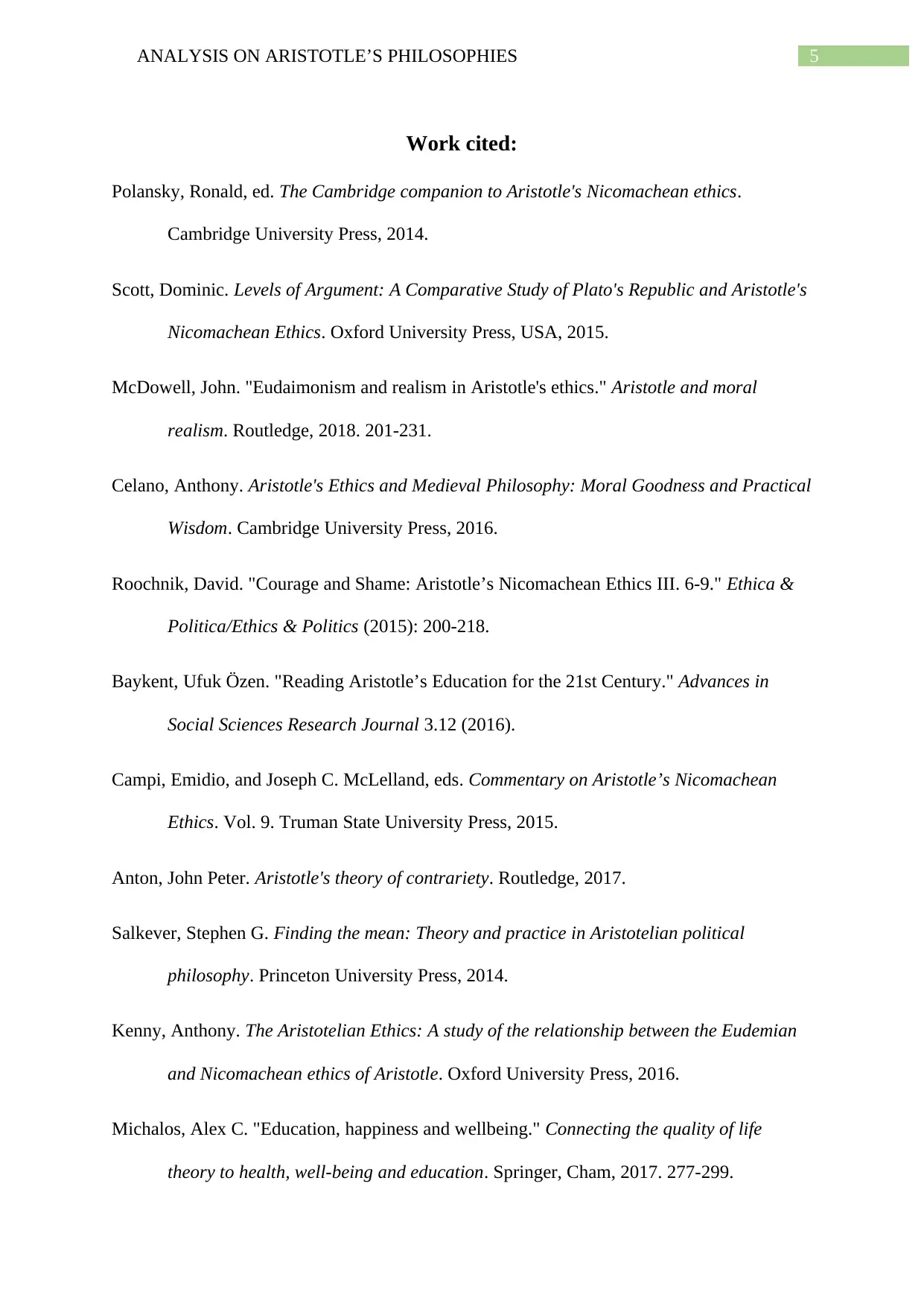
5ANALYSIS ON ARISTOTLE’S PHILOSOPHIES
Work cited:
Polansky, Ronald, ed. The Cambridge companion to Aristotle's Nicomachean ethics.
Cambridge University Press, 2014.
Scott, Dominic. Levels of Argument: A Comparative Study of Plato's Republic and Aristotle's
Nicomachean Ethics. Oxford University Press, USA, 2015.
McDowell, John. "Eudaimonism and realism in Aristotle's ethics." Aristotle and moral
realism. Routledge, 2018. 201-231.
Celano, Anthony. Aristotle's Ethics and Medieval Philosophy: Moral Goodness and Practical
Wisdom. Cambridge University Press, 2016.
Roochnik, David. "Courage and Shame: Aristotle’s Nicomachean Ethics III. 6-9." Ethica &
Politica/Ethics & Politics (2015): 200-218.
Baykent, Ufuk Özen. "Reading Aristotle’s Education for the 21st Century." Advances in
Social Sciences Research Journal 3.12 (2016).
Campi, Emidio, and Joseph C. McLelland, eds. Commentary on Aristotle’s Nicomachean
Ethics. Vol. 9. Truman State University Press, 2015.
Anton, John Peter. Aristotle's theory of contrariety. Routledge, 2017.
Salkever, Stephen G. Finding the mean: Theory and practice in Aristotelian political
philosophy. Princeton University Press, 2014.
Kenny, Anthony. The Aristotelian Ethics: A study of the relationship between the Eudemian
and Nicomachean ethics of Aristotle. Oxford University Press, 2016.
Michalos, Alex C. "Education, happiness and wellbeing." Connecting the quality of life
theory to health, well-being and education. Springer, Cham, 2017. 277-299.
Work cited:
Polansky, Ronald, ed. The Cambridge companion to Aristotle's Nicomachean ethics.
Cambridge University Press, 2014.
Scott, Dominic. Levels of Argument: A Comparative Study of Plato's Republic and Aristotle's
Nicomachean Ethics. Oxford University Press, USA, 2015.
McDowell, John. "Eudaimonism and realism in Aristotle's ethics." Aristotle and moral
realism. Routledge, 2018. 201-231.
Celano, Anthony. Aristotle's Ethics and Medieval Philosophy: Moral Goodness and Practical
Wisdom. Cambridge University Press, 2016.
Roochnik, David. "Courage and Shame: Aristotle’s Nicomachean Ethics III. 6-9." Ethica &
Politica/Ethics & Politics (2015): 200-218.
Baykent, Ufuk Özen. "Reading Aristotle’s Education for the 21st Century." Advances in
Social Sciences Research Journal 3.12 (2016).
Campi, Emidio, and Joseph C. McLelland, eds. Commentary on Aristotle’s Nicomachean
Ethics. Vol. 9. Truman State University Press, 2015.
Anton, John Peter. Aristotle's theory of contrariety. Routledge, 2017.
Salkever, Stephen G. Finding the mean: Theory and practice in Aristotelian political
philosophy. Princeton University Press, 2014.
Kenny, Anthony. The Aristotelian Ethics: A study of the relationship between the Eudemian
and Nicomachean ethics of Aristotle. Oxford University Press, 2016.
Michalos, Alex C. "Education, happiness and wellbeing." Connecting the quality of life
theory to health, well-being and education. Springer, Cham, 2017. 277-299.
⊘ This is a preview!⊘
Do you want full access?
Subscribe today to unlock all pages.

Trusted by 1+ million students worldwide
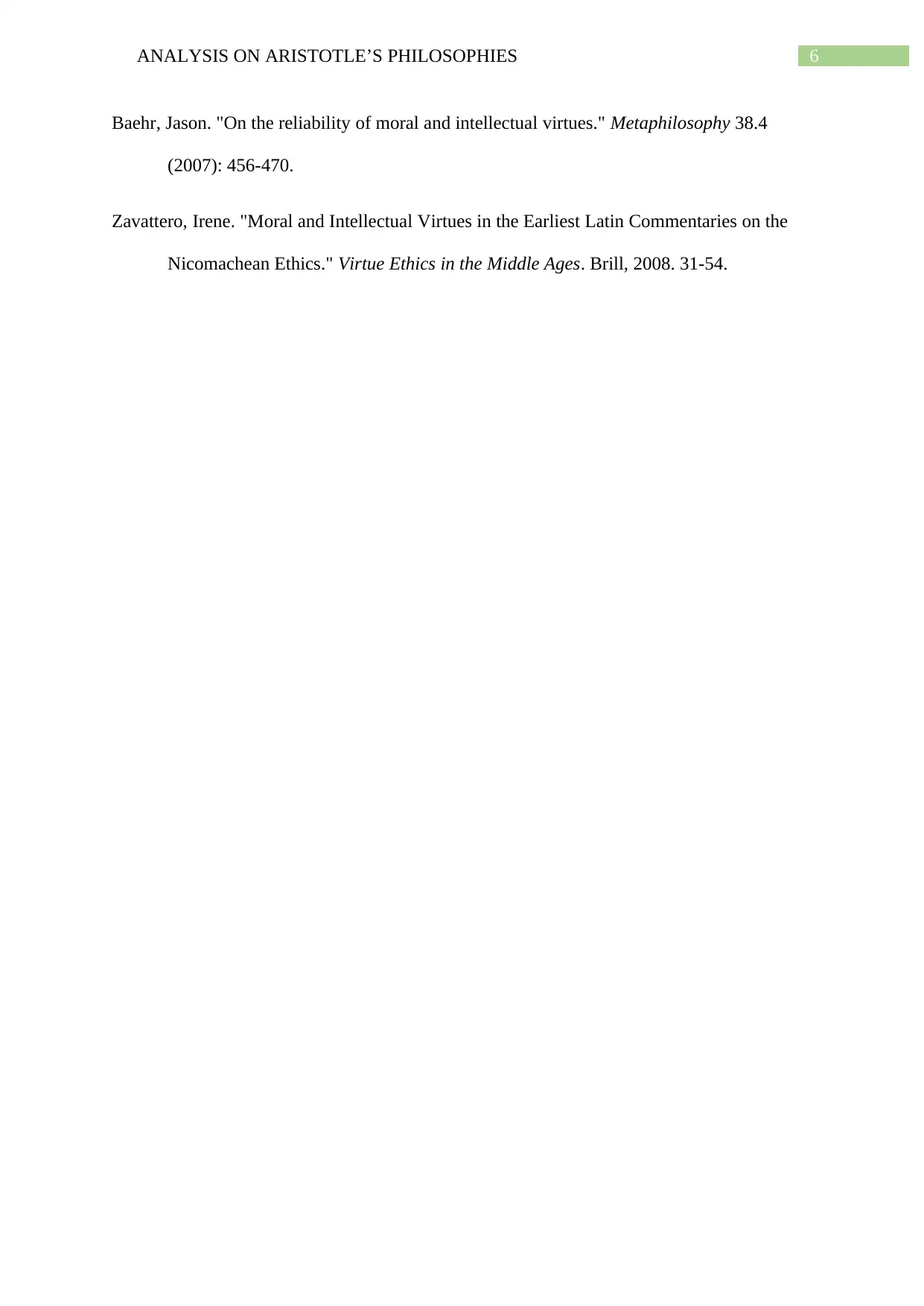
6ANALYSIS ON ARISTOTLE’S PHILOSOPHIES
Baehr, Jason. "On the reliability of moral and intellectual virtues." Metaphilosophy 38.4
(2007): 456-470.
Zavattero, Irene. "Moral and Intellectual Virtues in the Earliest Latin Commentaries on the
Nicomachean Ethics." Virtue Ethics in the Middle Ages. Brill, 2008. 31-54.
Baehr, Jason. "On the reliability of moral and intellectual virtues." Metaphilosophy 38.4
(2007): 456-470.
Zavattero, Irene. "Moral and Intellectual Virtues in the Earliest Latin Commentaries on the
Nicomachean Ethics." Virtue Ethics in the Middle Ages. Brill, 2008. 31-54.
1 out of 7
Related Documents
Your All-in-One AI-Powered Toolkit for Academic Success.
+13062052269
info@desklib.com
Available 24*7 on WhatsApp / Email
![[object Object]](/_next/static/media/star-bottom.7253800d.svg)
Unlock your academic potential
Copyright © 2020–2025 A2Z Services. All Rights Reserved. Developed and managed by ZUCOL.





